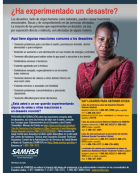This Advisory outlines how healthcare providers (i.e., obstetrician-gynecologists [OB-GYNs], primary care physicians, and other professionals who treat pregnant people) can take an active role in supporting the health of pregnant individuals who have OUD and their babies.
Dashboard: Filter Bricks
Main page content


Disaster survivors are not always aware of behaviors in themselves or others that are associated with adverse reactions to a disaster. This poster assists adult disaster survivors with identifying possible reactions and provides resources to turn to for help.
Los sobrevivientes de acontecimientos catastróficos no siempre están conscientes de los comportamientos, sea en sí mismos o en otras personas, que están relacionados con reacciones adversas a estas experiencias. Este póster ayuda a los adultos que han sobrevivido un acontecimiento catastrófico a ide.

Disaster survivors are not always aware of behaviors in themselves or others that are associated with adverse reactions to a disaster. This poster assists adult disaster survivors with identifying possible reactions and provides resources to turn to for help.

The National report presents indicators as measured through the 2017 National Survey on Drug Use and Health and the National Survey of Substance Abuse Treatment Services. State reports provide a snapshot of substance use and mental health in the United States.

This report presents national data about the prevalence of behavioral health conditions. This data includes the rate of serious mental illness, suicidal thoughts, substance use, and underage drinking. The report also highlights the percentages of those who seek treatment for these conditions. The state-level Barometers contain valuable insight into the behavioral health needs and the unique challenges faced by communities across the country. This analysis can help public health authorities and others determine the best ways of meeting behavioral health care needs and disparities among various communities.

Summarizes key findings from the 2015 National Survey on Drug Use and Health (NSDUH) for indicators of substance use and mental health among people aged 12 years old or older in the civilian, non-institutionalized population of the United States.

This brief highlights the relationship between substance use and suicide and gives an overview of the issue. It describes for state and tribal prevention professionals evidence-based programs that focus on substance use and suicide prevention.

This report presents national data about the prevalence of behavioral health conditions. This data includes the rate of serious mental illness, suicidal thoughts, substance use, and underage drinking. The report also highlights the percentages of those who seek treatment for these conditions. Access state barometer reports.

This advisory defines attention deficit hyperactivity disorder in adults, and explains interactions with substance use disorders.

This guide provides guidelines for brief treatment and counseling with adults living with a marijuana dependence. It describes common treatment issues, assessment of marijuana use, motivational interventions, and how to change marijuana use through skill building.
Displaying 1 - 10 out of 17

